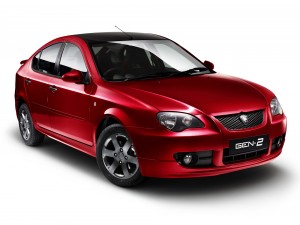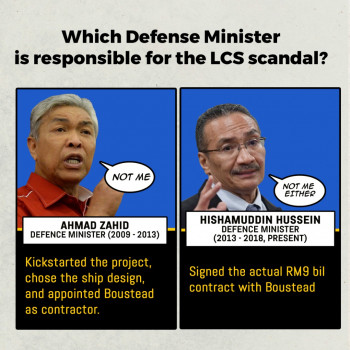 After working in the consumerist mecca Kuala Lumpur for several years, 27-year old Foo Fei decided to replace her antique motorcycle with a car. She surveyed prices and specifications of cars available in the market.
After working in the consumerist mecca Kuala Lumpur for several years, 27-year old Foo Fei decided to replace her antique motorcycle with a car. She surveyed prices and specifications of cars available in the market.
Soon, she arrived a conclusion that foreign cars are safer, more comfortable and more reliable than national cars. However,-Proton &Perodua have a price advantage, at the same engine capacity, the national car duo are RM 20,000 cheaper.
Foo Fei eventually decided to buy a Proton Saga car worth RM 38,000 on the grounds that no matter how good foreign cars are, its costs were beyond her financial affordability.
This is an ordinary urban story, but it happens every day in Malaysia.
Foo Fei might then pat herself on the back, thinking that she made the right decision and saved herself a lot of money.
Choosing Proton or Perodua helps many Malaysians save money, but in fact the national carmakers help Saudi Arabians save even more.
In a parliamentary answer, the Ministry of Finance revealed that brand new Proton Waja, Gen 2 and Persona cars were selling at a maximum of RM 43,570 between 2008 and 2009 in Saudi Arabia. Mind you, the lowest price could even go as low as RM 33,200 for a Gen 2 1.6 M/T L-Line car.
In contrast, the same cars are sold locally at a minimum price of RM 52,999, RM 52,988 and RM 52,999 respectively. For further information, kindly visit Proton Edar’s official webportal (http://www.proton-edar.com.my/).
Figure 1: Same cars, but cheaper in Saudi Arabia…
| Type | Sale prices in 2008 (RM) | Sale prices in 2009 (RM) | Sale prices in Malaysia in 2011 (RM) |
| Waja M/T STD | 38,390 | 39,900 | 52,999 |
| Waja A/T STD | 40,566 | 42,100 | 55,999 |
| Waja A/T Premium | 41,900 | 43,570 | 59,499 |
| Waja M/T Premium | 39,790 | 41,300 | |
| Waja A/T Base | 37,960 | 39,450 | 46,499 |
| Waja M/T Base | 35,800 | 37,232 | 49,499 |
| Gen 2 1.6 M/T L-Line | 33,200 | 34,500 | |
| Gen 2 1.6 M/T M-Line | 35,900 | 37,300 | |
| Gen 2 1.6 A/T L-Line | 35,200 | 36,600 | |
| Gen 2 1.6 A/T M-Line | 37,500 | 39,000 | 54,988 |
| Gen 2 1.6 A/T H-Line | 38,000 | 39,500 | 60,488 |
| Gen 2 1.6 M/T H-Line | 36,500 | 37,900 | 57,488 |
| Persona 1.6 MT L-Line | 34,400 | ||
| Persona 1.6 AT L-Line | 36,500 | ||
| Persona 1.6 MT M-Line | 37,300 | 52,999 | |
| Persona 1.6 AT M-Line | 39,000 | 55,999 |
Sources: Ministry of Finance’s written parliamentary answer to Member of Parliament for KubangKerian, SalahuddinAyub, 11 October – 16 December 2010; http://www.proton-edar.com.my/
Why are the same cars being sold at cheaper prices in Saudi Arabia? The national cars use so many local spare parts. Coupled with local assembly and the absence of import tax levy, it should be well able to charge prices that are competitive and affordable for Malaysians.
Naturally, Foo Fei was annoyed to discover this, but she could not figure out the justification for higher car prices in Malaysia. After some diligent googling, she was finally enlightened.
The answer is although Proton and Perodua are national car manufacturers and exempted from import duties, they are levied excise duty and sales tax, which are minimum 65% and 10% respectively, according to Aisha Ahmad, the President of Malaysian Automotive Association.
Aisha said in January 2011 that every car sold in Malaysia had been levied 65-105% excise duties, not including 10% sales tax, adding that Thailand’s excise duty is about 35%, by contrast.
If every national car is levied 75% taxes, then every car owner will have to contribute RM 15,000, RM 17,142, RM 19,285 or RM 21,428 for the government for buying a car worth RM 35k, 40k, 45k or 50k.
Aisha said Malaysians currently paid RM6 billion in excise taxes on cars per annum to the government.
Contributing so much money to the country is an honor for Malaysia’s car owners, but they do not do so voluntarily.
Aisha added that the Association was lobbying the government to lower the excise duties to be in line with other ASEAN countries but had been rejected.
The given reason was that the government needs the money!
Proton began developing national cars since 1985, but im sure the public is well aware of how Proton is doing now. People have already lowered their expectations towards Proton and never dare to hope it becomes Southeast Asia’s Toyota, but people do hope that Proton can provide at least competitive prices in comparison with foreign cars.
Indeed, the government does meet the people’s expectations of making national cars’ prices lower than foreign ones, but this is achieved by imposing high duties on the latter.
Frankly speaking, this method doesn’t seem have improved the national cars’ competitiveness but the people’s economic competitiveness has been sacrificed instead.
Moreover, these irrational duties have created great disparities between national cars’ prices locally and overseas. Apart from Saudi Arabia, the national car’s prices in the United Kingdom and Singapore are also cheaper than in our homeland.
PKR Deputy President Azmin Ali points the finger at Putrajaya for higher-than-necessary car prices. “At least 70% of RM118 billion in passenger car loans borne by Malaysians is due to high taxes imposed by the government,” he says.
Here comes another question, is the government helping the people, or are the people helping the government instead?
Minister in Prime Minister’s Department Idris Jala said in May last year that the government had spent nearly RM 74 billion in all kinds of subsidies to help the people. Among others, RM 42.4 billion was for social subsidy, RM 23.5 billion was for fuel and energy consumption, RM 4.8 billion was for infrastructure and RM 3.4 billion was for food.
Idris added RM 74 billion is equivalent to RM 12,900 for each household in Malaysia.
It is true that the government is subsidizing the people, but the latter is also pumping money back to the government through contributing RM 6 billion car excise duties annually, not to mention countless other taxes which are the government’s main source of revenue.
Paying taxes is the duty of citizens, but people expect their tax money to be used in appropriate ways, like improving social welfare, infrastructure, national competency, environment protection and others. The people definitely do not appreciate their taxes being treated as a blank cheque for white elephant projects.
Currently, the government represented by Idris Jala is promoting a policy that to cut subsidizes in return for reducing government’s RM 103 billion expenditures in next five years.
As far as the people are concerned, it is an unavoidable trend to reduce subsidizes for the sake of increasing national competitiveness.
Nevertheless, it is strongly recommended to cut subsidizes for mega projects, like Independent Power Producers, before shelving programs which will benefit the grassroots. – The Rocket



